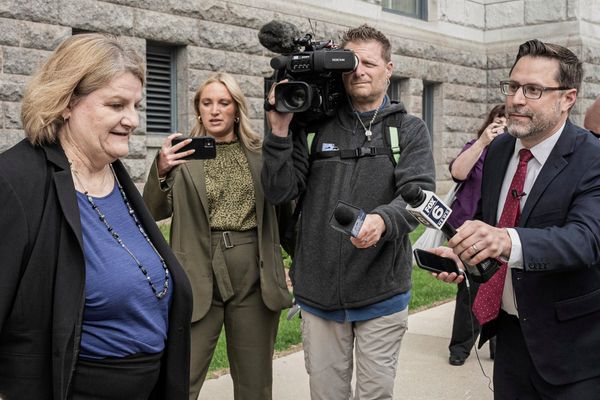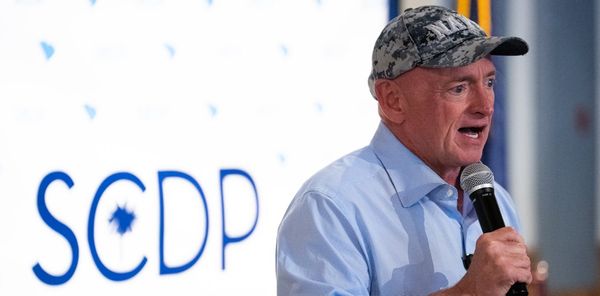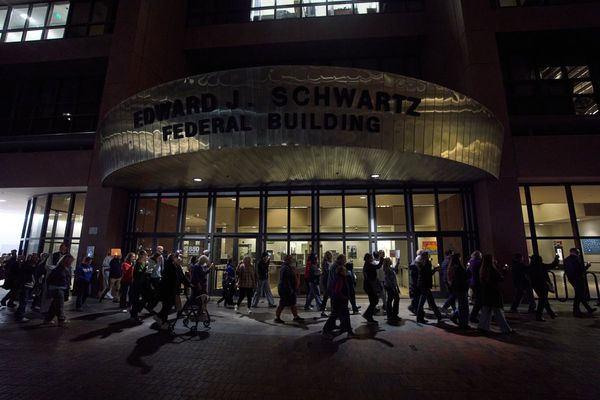
Good morning. If you haven’t noticed, the lead-up to this year’s budget has been unusually chaotic and drawn-out, with plenty of behind-the-scenes briefings and a whirlwind of speculation about what taxes will be hiked.
The challenge facing the chancellor, Rachel Reeves, is plugging a financial hole of around £20bn and raising money to fund the services voters demand, while also keeping taxes at an acceptable level. (If you think you’ve got what it takes, try our brilliant interactive budget game). The political backdrop to this budget is also significant – the prime minister is under siege, and needs to present something that will be well received by MPs.
The speaker of the house, Sir Lindsay Hoyle, described it as a “hokey cokey budget: one minute something is in, the next minute it is out”, and called out ministers for leaking major announcements, while Reeves has said she is “sick of people mansplaining how to be chancellor”. Reeves is adamant that she has stuck to key “Labour values”, and is prioritising the NHS, the cost of living and public debt.
None of this yo-yoing is good, says Guardian’s economics editor, Heather Stewart, who I spoke to for today’s newsletter. Budgets should be dull, with as little buildup as possible. “I don’t remember a run-up to a budget that’s been as wild as this one in terms of speculation,” she says. So what can we expect from Reeves’s much-awaited budget and how is it going to be received? That’s after the headlines.
Five big stories
Budget | Rachel Reeves’s plan to cut cash Isa limits by 40% could raise mortgage rates, according to finance bosses. The chancellor is expected to cut the maximum amount people can put into tax-efficient cash individual savings accounts from £20,000 to £12,000 in Wednesday’s budget.
Politics | Three more school contemporaries who claim to have witnessed Nigel Farage’s alleged teenage racism have rejected the Reform UK leader’s suggestion that it was “banter”, describing it as targeted, persistent and nasty.
Ukraine | Donald Trump’s special envoy Steve Witkoff advised a senior Kremlin official on how Vladimir Putin should pitch a Ukraine peace deal to the president, according to a transcript of their discussion published by Bloomberg.
Criminal justice | Jury trials for all except the most serious crimes such as rape, murder and manslaughter are set to be scrapped under radical proposals drawn up by David Lammy
Media | The BBC has been pulled into a fresh row over its treatment of Donald Trump after a Reith lecturer accused the broadcaster of censoring his remarks on the US president. Rutger Bregman, a Dutch author and historian, said the BBC removed a “key line” from a flagship address it had invited him to deliver.
In depth: ‘It’s a very important moment in the battle for the future of the party’
The biggest budget furore had been over Reeves’s bold plan to break one of Labour’s fundamental manifesto pledges and raise income tax. It would have made her the first chancellor in half a century to do so, which would have been a “massive political risk for Labour”, explains Heather.
Reeves had been expected to raise income tax by up to 2p. However, earlier this month it was revealed that she had abandoned that plan amid party turmoil and will instead make a series of smaller tax increases to try to generate some of that revenue. Treasury sources suggest Reeves is now looking for an extra buffer of £15bn.
One of the biggest levers she can pull in terms of taxation is extending the freeze on income tax thresholds, which dictate how much you can earn before you move into the next tax band. Normally, the thresholds at which taxpayers move into higher rates of income tax move up each year in line with inflation; freezing income tax thresholds for an extra two years to 2030 is expected to raise £7.5bn a year. “It’s a sneaky way of bringing in a lot of extra money,” says Heather.
It was speculated that this could have been introduced in last year’s budget, but Reeves said at the time that it would make working people worse off (the policy was introduced by the Conservatives). “She didn’t quite say it would break the manifesto, but she seemed to suggest at the time it wasn’t in the spirit of the manifesto and that’s why she wasn’t doing it, so it could be quite controversial,” says Heather. “That’s likely to be one of the bigger measures”.
***
Higher council tax for higher-value homes?
For a long time, economists have argued that the council tax regime in England is regressive and unfair, as it is based on house valuations from 1991.
Labour will reportedly revalue some of the most expensive properties across council tax bands F, G and H, with the threshold for revaluing a property starting at £2m.
“The idea is there are lots of people who’ve done really well out of the property market in the last 20 years and this is a way of raising a bit of extra money from them,” says Heather. Indeed, half of British wealth is in property. It’s expected that about 100,000 homes will be hit, with the cash going directly to the Treasury, as opposed to local councils. .
Some have billed it as a “mansion tax”, although it looks as if Labour will go for a flat fee of a couple of thousand pounds each year. “It is in effect a wealth tax, but it’s not a percentage of every asset you own,” says Heather. “It also won’t hit the owners of the most expensive homes as hard as a full-blown ‘mansion tax’ might.”
***
Scrapping the two-child benefit cap?
The two-child limit restricts household welfare income for families on means-tested benefits by blocking payments of £3,500 per child for their third and subsequent children. Introduced in 2017, it is seen as a powerful driver of child poverty and symbol of Tory-imposed austerity, with the latest figures suggesting that 1.7 million children live in homes affected by the policy.
“Every expert and every charity that you talk to says the best targeted way of tackling child poverty is getting rid of that cap,” says Heather.
It isn’t clear if Labour will get rid of it, but Reeves has gone on the record saying that it isn’t fair to penalise children just because they’re part of a bigger family. “It looks as though they will lift the two-child benefit cap, which has been massively controversial. They’ve delayed making a decision about it for a long time,” says Heather.
Labour has promised to publish a child-poverty strategy, but that hasn’t yet materialised, although scrapping the two-child limit in full would probably be welcomed by Labour MPs.
“Hopefully, Reeves and Starmer want to tackle child poverty, but there is also a political backdrop to this budget, which is that the prime minister is under siege from his own party,” says Heather.
“Today’s budget is a really important moment in this battle for the future of the government and the party. Starmer and Reeves are very keen to present a budget that Labour MPs will welcome, that they will see as progressive and in line with ‘Labour values’.”
In her spring statement, Reeves announced deep cuts to welfare and other public spending, which she later U-turned on. “Of the measures that we know about, there’s nothing that would spark a kind of instant rebellion or fury along the lines of what we saw after the welfare cuts,” says Heather. “Whether this budget enthuses them is another issue.”
***
Tackling the cost of living crisis?
Labour is likely to announce a series of measures designed to ease the cost of living crisis. Writing in the Mirror and the Sunday Times this weekend, Reeves acknowledged that high prices “hit ordinary families most”. “Labour is really conscious that voters don’t feel like that cost of living crisis is over … people are still struggling,” says Heather.
Rail fares will be frozen in the budget, saving commuters on pricier routes more than £300 a year. The cost of an NHS prescription in England will be frozen at £9.90.
The chancellor is also thought to be considering a 3p per mile tax for electric vehicles (EVs) to protect revenues as people shift away from petrol and diesel. She will also subsidise the buying of EVs, with £1.3bn going into a grant that knocks up to £3,750 off the purchase price.
“Between March and now, when the Office for Budget Responsibility has been redoing its forecast, nothing’s fallen off a cliff. The labour market’s slowing a bit, unemployment’s rising a bit. I wouldn’t say things are rosy, but I don’t think they’re disastrous either,” says Heather. “What Rachel Reeves is really hoping to do is win over the markets and say, look, ‘I’ve got all this under control. I can promise you stability. I’ve got a plan. Don’t worry.’”
“As reporters, we will of course be watching the impact on MPs, but we will also be very closely watching what’s happening in the bond markets and whether there’s any sort of wobble there that could cause her problems further down the line.”
It’s important that a chancellor’s principles are clearly understood by the public – and the markets – for stability and economic health. “Hopefully, we all feel more cheerful by spring,” concludes Heather … with a note of uncertainty.
What else we’ve been reading
While not entirely convinced that I could sit through a five-hour stage play – frankly, most movies are too long, in my view – Jesse Hassenger’s report about Initiative, a US production based on the role-playing game Dungeons & Dragons, has intrigued me. Martin
I loved the stunning, stealthy images from this Nature inFocus competition winners gallery; from Blue Aura, a delicate cranefly portrait by Bidyut Kalita, to The Canopy Watcher, a male chimp captured relaxing on a hammock of vines by Federica Cordero. Karen
Halima Jibril writes passionately for Dazed on the experience of divesting from “beauty noise”, the all-pervasive pressure for young women to live up to specific standards of appearance. Martin
In a follow-up to their investigation on the Free Birth Society (FBS), covered in First Edition on Monday, Lucy Osborne and Sirin Kale reveal that the NHShad been directing pregnant women to a website that connected them to the FBS, a group linked to baby deaths around the world, which promotes labour without medical support. The NHS, which no longer directs them to the site, said it “does not endorse” the FBS or its ideology, “which could harm women”. Karen
The NBA’s dress code began as a racially charged flashpoint, but 20 years after it was introduced, Branson Wright says that it has become a cultural engine celebrated by players, and followed by millions worldwide. Martin
Sport
Football | Chelsea romped to a dominant 3-0 win at home to 10-man Barcelona in the Champions League, while Manchester City went down 2-0 against Bayer Leverkusen. In the south of France, Marseille roared back from an early Ashley Barnes goal to beat Newcastle 2-1.
Cricket | Graham Thorpe’s widow believes he would still be alive if there had been more support from the England and Wales Cricket Board after he left his coaching role with the governing body.
Rugby league | England’s rugby league team will go into next year’s World Cup without playing a fixture for almost an entire year, after it was confirmed there was no room in the 2026 Super League schedule to give the national team a mid-season international break.
The front pages
The Guardian leads with “Reeves vows to tackle cost of living crisis in decisive budget for Labour”. The Mirror looks to the budget with “Help is at hand”, while the Times has “Reeves aims at workers, savers and pensioners”. The i characterises it as the “Moment of truth for Reeves – and UK economy”.
The Financial Times reports “Reeves prepares tax-heavy Budget in bid to show she has control of finances”. The Mail has “Reeves faces chorus of condemnation for ‘pricing young people out of work’”. The Sun takes a look at “Rachel Reeves’ budget ledger”. Finally, the Telegraph reports “Jury trials scrapped for most crimes”.
Today in Focus
The frantic push to bring peace to Ukraine
There have been deals and counter deals. But how close has the flurry of diplomacy brought us to a ceasefire? Pjotr Sauer reports.
Cartoon of the day | Ella Baron
The Upside
A bit of good news to remind you that the world’s not all bad
Nature restoration, a relatively new discipline, is dominated by big players, well-funded trusts and well-established experts, writes Steve Rose.
But in this uplifting piece, Rose looks at what happened when five young nature enthusiasts with little experience were let loose on Maple Farm, a former retirement home for horses in rural Surrey.
He met some of the founders of the Youngwilders a youth-led, youth engagement movement, to see the results of their, at times, unorthodox approach to nature restoration. Jack Durant, one of the group’s co-directors, told him the premise was to persuade landowners, to “allow a bunch of idiots on their land indiscriminately, to make fairly massive decisions that would affect land value”.
On Maple Farm, they removed giant hogweed, an invasive species, and planted low scrub and hedgerow to encourage nightingales.
Four years later, Rose found that “nature is returning in droves”, with melodic nightingales, grass snakes, bats and insects making a comeback. Now, the group have 12 projects across the UK.
Sign up here for a weekly roundup of The Upside, sent to you every Sunday
Bored at work?
And finally, the Guardian’s puzzles are here to keep you entertained throughout the day. Until tomorrow.







